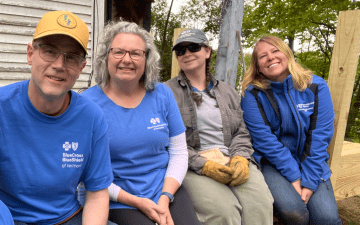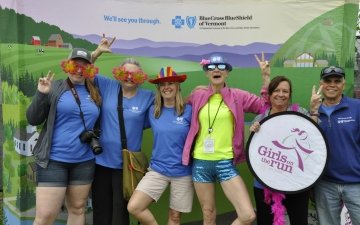Climb Out of the Darkness Combats Isolation for New Parents

It's estimated in Vermont that one in five people suffer from depression and anxiety both during and after pregnancy. During the pandemic, Perinatal Mood and Anxiety Disorders (PMADs) intensified, growing to one in three people.
Along with pregnancy and transition to parenthood comes a whole host of feelings—excitement, fear, anxiety, depression, exhaustion, happiness, and scary thoughts. While many people associate expecting a baby with a joyful “pregnancy glow,” it is estimated that in Vermont, one in five people suffer from depression and anxiety both during and after their pregnancy. During the pandemic, the crisis of Perinatal Mood and Anxiety Disorders (PMADs) and isolation intensified, growing to one in three people, according to Support Delivered, a program of the Vermont Department of Health.
“We have many efforts in the state, including with our Central Vermont Perinatal Mental Health Coalition, to educate the general public about Perinatal Mood and Anxiety Disorders,” says Jennifer Auletta, a licensed clinical mental health counselor with a specialty in maternal health at Central Vermont Medical Center (CVMC). “Transition to parenthood comes with so many changes—in identity, in relationships, daily routines, responsibilities, worries, returning to work, and finding child care. There is a lot of room for anxiety in becoming a new parent, or when welcoming another baby into the family.”
Perinatal Mood and Anxiety Disorders
PMADs are common and it can come on at any time during pregnancy or in the first year after pregnancy. Feeling overwhelmed, irritable, guilty, angry, losing interest in previously pleasurable activities, having scary or unwanted thoughts, and exhaustion coupled with insomnia are all symptoms of perinatal mood or anxiety reactions. These feelings are common, can be uncomfortable and scary, but they can be addressed with support.
“Parenting a new baby is always a challenge, but it has been particularly isolating during the pandemic,” says Gretchen Elias, Executive Director of Good Beginnings of Central Vermont. “It is normal to feel overwhelmed.”
The organization is hosting its fifth annual Climb Out of the Darkness event on June 25 from 10AM to noon at the State House lawn. The event offers a chance for families to connect with each other and learn about the many supportive community resources available in Central Vermont for families with new babies.
The feeling of isolation can be crippling to new parents, something the connections that are made at the event are intended to alleviate. One mother, who preferred to speak anonymously so will be called Emily, had moved to Vermont with her husband during her first pregnancy. After working her entire adult life, she suddenly found herself alone all day while her husband transitioned quickly with a busy job that kept him away from home for long hours.
“I hated being pregnant,” said Emily. “I was just mad. I was being medicated for PTSD and getting the help I needed through telehealth at home, but there was enough circumstantial stuff that I was just falling apart. Pregnancy made it all the harder. I was in a pretty rough spot overall.”
Support for New Parents & Families
Jennifer Auletta, who offers perinatal mood and anxiety counseling at CVMC, noted that women like Emily are not alone in feeling that way. Auletta has been treating perinatal mood and anxiety disorders for 20 years. Working within the Women’s Health Initiative under Vermont’s Blueprint for Health, she also connects her patients with birthing classes, the Better Beginnings program through Blue Cross and Blue Shield of Vermont, prenatal yoga classes, Good Beginnings of Central Vermont, Central Vermont Home Health and Hospice, and other community support groups that can offer strong wrap around care, supporting as many new parents as possible and allowing them to enjoy their newborn.
The Blue Cross Better Beginnings program offers members nurse care coordination with referrals to extensive supports both during and after pregnancy, as well as a free breast pump to help nursing mothers, a reimbursement for birthing classes. If members sign up before 34 weeks, they are eligible for additional reimbursements for a car seat, as well as the choice of fitness classes, a postpartum doula, or a cleaning person.
“If you care about babies and children, you have to care about their parents,“ says Auletta. Connecting people with local supports isn’t always as easy as a referral, however, which is why the tight network of resources in Central Vermont is so important. Where one program might not be the right fit, another may be just what they need to be lifted out of their anxiety.
When Emily reached out to Good Beginnings, the staff told her they would find a good match for her through the Postpartum Angels program. That match became a lifeline. A volunteer started coming a few hours a week after the baby was born. Her volunteer would hold the baby so she could shower, or help with the seemingly endless pile of dishes, or folding the mountain of tiny little onesies in the laundry.
“I just needed someone to talk to me. She and I became very good friends. She didn’t just disappear. In my case, the Postpartum Angel program gave me a tether.” Moving to Vermont was a culture shock. For the first time in her adult life, she suddenly had no job, a brand new baby, and there was so much snow. Good Beginnings “gave me a way to be connected to the community.” With the barrier of driving in the snow keeping her further isolated, her volunteer was able to get her out of the house, going shopping for Christmas decorations and showing her where the coffee shops were. “To have someone to talk to—to get me outside—it was a lifeline.”
Asked what advice she would give to other parents enduring perinatal mood disorders and isolation, she quickly answered, “if there is anything like Good Beginnings near you, just do it. It was hard for me to send that email to sign up. It was hard to say this is me and this is where I am at. But putting myself out there was the best thing I could have done for myself. They did not let me fall through the cracks.”
If you or someone you know needs support, the National Maternal Mental Health Hotline, operated by Postpartum Support International is available through call or text at 1-833-9-HELP4MOMS, 24 hours a day, 365 days a year for pregnancy, postpartum, and pregnancy-loss support. Trained counselors are on hand to provide confidential, culturally-informed and trauma-informed support as well as to offer referrals to community-based and telehealth providers.
Resources for Families
Better Beginnings is a free program is available to all Blue Cross and Blue Shield of Vermont members who are expecting a new baby. Members are encouraged to sign up before their 34th week of pregnancy to have access to the full array of benefits. The program offers members nurse care coordination with referrals to extensive supports both during and after pregnancy, as well as a free breast pump to help nursing mothers, a reimbursement for birthing classes, and nine hours of an in-home cleaning person or postpartum doula care.
Good Beginnings of Central Vermont offers an extensive suite of free resources to new and expecting parents. They coordinate the Postpartum Angel Support Program, connecting new parents with volunteers from their community, and the organization offers a multitude of ways for new parents to connect with each other through Baby Circle Time, the Nest, and community parenting events. One new mother said, she just had to provide her contact information before leaving the hospital and, “Within a week Good Beginnings called. I didn’t even have to call them, the hospital let them know that I had had the baby.” Newly arrived in Vermont and feeling completely isolated, “They gave me a way to be connected to the community.”
Bosom Buddies breastfeeding group is supported through Central Vermont Medical Center. The group meets on the first Tuesday of each month from 5:30-7:00 PM.
The Doula Project includes three components: prenatal, labor and postpartum support, and are approached with the understanding that women suffering from mental health issues, with cognitive limitations, who are trauma survivors or who struggle with addictions have a unique set of needs. The project is available to any woman who receives or is eligible to receive services from Washington County Mental Health Services (WCMHS).
Postpartum Support International (PSI) provides telephone and text support, online groups and meetings 5 days a week, and peer mentors. Resources are also available for perinatal mental health providers. Vermont's chapter of Postpartum Support International provides a VT based warm line with local coordinators who offer support, information, and encouragement. Virtual support groups can be joined through their website.
- Call the PSI HelpLine: 1-800-944-4773, #1 En Español or #2 English
- Text “Help” to 800-944-4773 (EN)
- Text en Español: 971-203-7773
The National Maternal Mental Health Hotline is operated by Postpartum Support International. Call or text 24/7, 365 days a year in English, Spanish, and other languages by request for pregnancy, postpartum, and pregnancy-loss support. Trained counselors are on hand to provide confidential, culturally-informed and trauma-informed support as well as to offer referrals to community-based and telehealth providers. Call 1-833-9-HELP4MOMS
Vermont 2-1-1 and Help Me Grow Vermont connects expecting and new families to mental health clinicians with specialized expertise in treating PMADs and other community services.
- Call 211, option 6
- Text HMGVT to 898211
- Email info@helpmegrowvt.org
Empty Arms Vermont offers support groups and trainings for providers for individuals and families whose babies have died through miscarriage, stillbirth, early infant death, or termination for medical reasons.
Options Counselors
- Central Vermont Medical Center Women’s Health
- LUND
- Planned Parenthood of Northern New England
Central Vermont Home Health and Hospice maternal and child nurses offer lactation support, nutrition information for parent and baby, skilled nursing, and one-on-one support.
Family Center of Washington County offers parent education, playgroups, child care, family support home visiting and more supports for families, youth and children.
Trainings and Clinical Support for Perinatal Providers
The University of Vermont Project ECHO (Extension for Community Healthcare Outcomes) series “Perinatal Mental Health: Preconception Through the First Year Postpartum” was created for health professionals to share best practices and evidence-based care for screening and treating patients with perinatal mood and anxiety disorders. The 2021-2022 project is a collaboration among the Vermont Department of Health and the Vermont Department of Mental Health through the federal HRSA Screening, Treatment & Access for Mothers and Perinatal Partners, or STAMPP grant funding, The UVM Larner College of Medicine Office of Primary Care, and the AHEC Program. This free tele-education series has included topics ranging from depression and anxiety in the prenatal period, to cultural considerations in perinatal mental health. The final session in the series is on June 14 will cover birth trauma/perinatal grief and loss. Project ECHO offers an opportunity for health professionals to engage in cohort-based learning and case review in a peer supportive environment around perinatal mental health, a tremendous resource for interdisciplinary health professionals to learn from and with colleagues and topic experts by embracing an “all teach, all learn” philosophy.”



